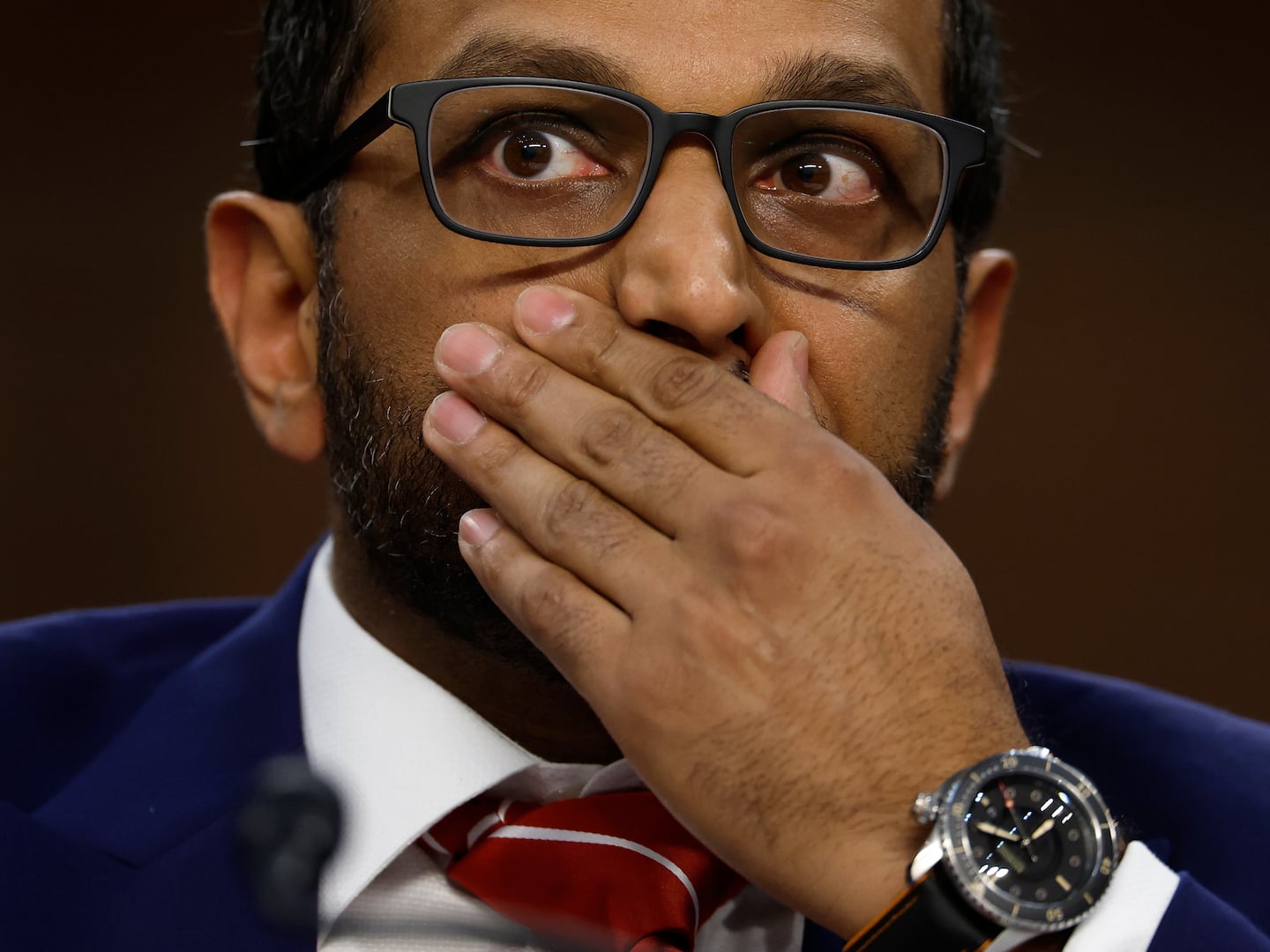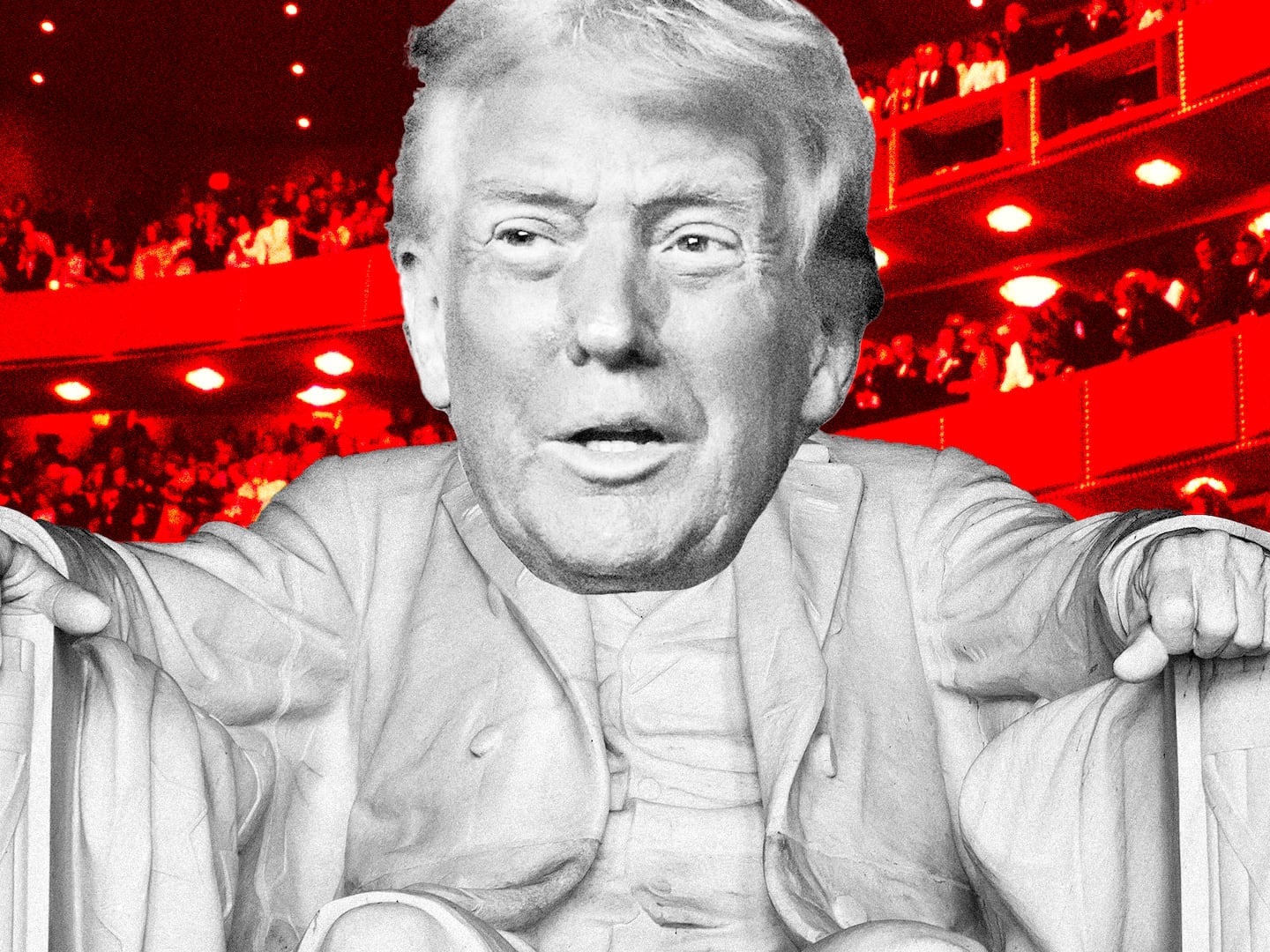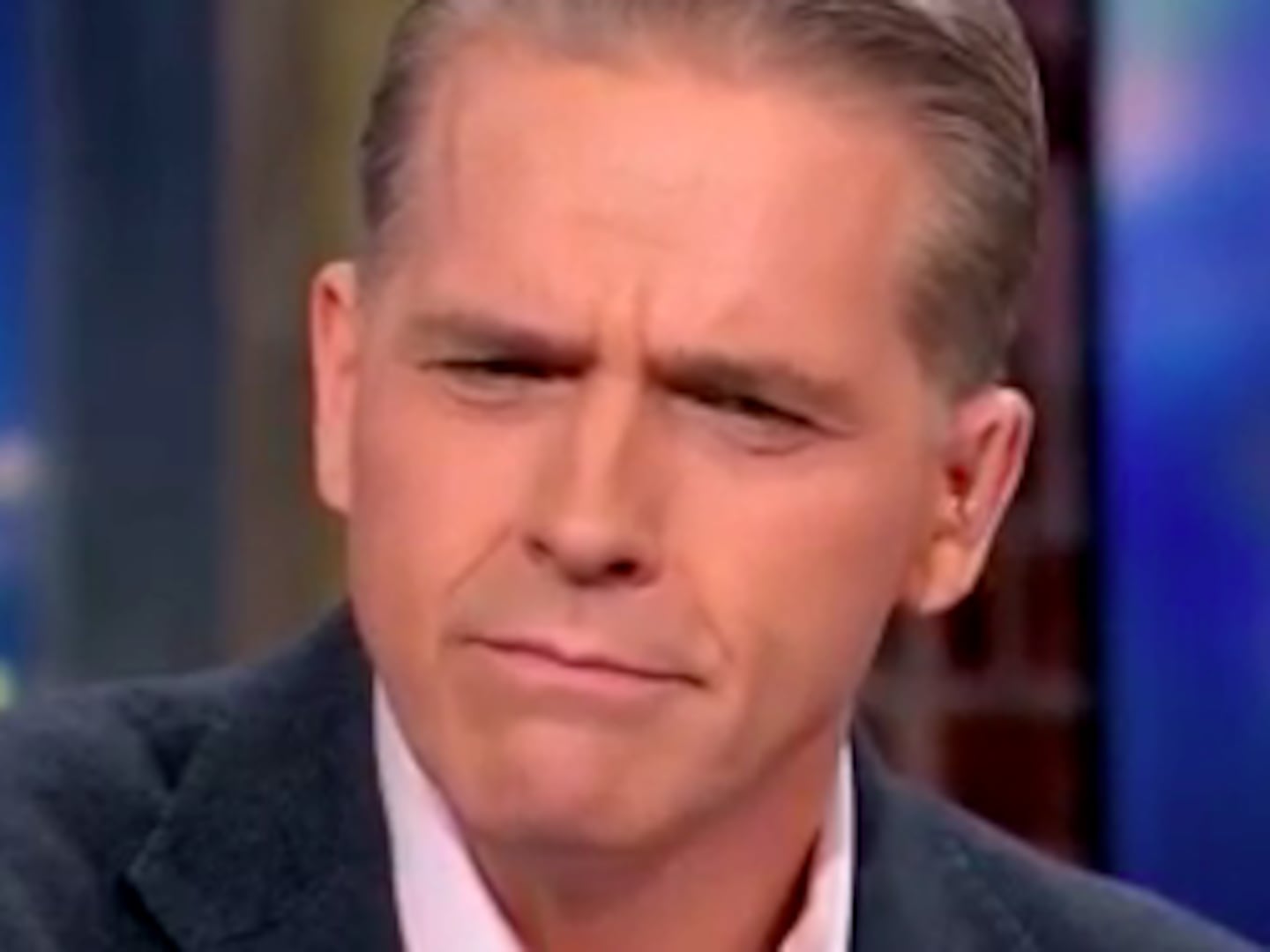Given the delight that Stephen Colbert has indulged his torment of Donald Trump over the years—for instance, in 2012 offering to dip his balls into Trump’s mouth for $1 million—fans’ hopes may have been high for a lacerating first on-screen encounter between the host and the leading Republican presidential candidate on Tuesday night’s Late Show.
A brilliant Trump-related sketch was one of the highlights of Colbert’s first Late Show on September 8, when the host hurriedly stuffed his mouth full of Oreos after Trump had sworn off them because Nabisco, makers of Oreo, is moving some of its operations to Mexico.
The more Trump clips Colbert played, the more self-loathing welled up inside Colbert as he strained for “a modicum of dignity” by trying not to talk about Trump.
The more futile the struggle became—a satire itself on the media’s insatiable obsession with the hair-challenged candidate—the more Oreos Colbert mainlined, until they were raining down from the packet into his chocolate-crammed mouth.
Trump’s ubiquity was the subject of Colbert’s humor on Tuesday before his guest appeared on stage. Here, he told the audience dryly, was finally a place to hear about Donald Trump.
“Who knows? One day I might be able to tell my grandkids I interviewed the last President of the United States,” he added, a light but pointed allusion to the effects of a possible Trump presidency.
But as soon as Trump appeared on stage, Colbert turned mighty respectful, and later—even more shockingly—genuinely contrite, as he apologized to Trump for the “unforgivable” things he had said about him.
“There’s no other way to say it. Ladies and gentlemen, Donald Trump,” he said, ushering Trump on to the stage.
To mirror his strangely chastened host, Trump too—in regulation blue suit and livid red tie—walked out in the most low-key way we have seen him. A little shuffle, thumbs gently up, coy smile: It felt like a first date, rather than gladiatorial encounter.
Not even Jon Batiste and band singing aggressively, “You got the money,” produced a Trumpian swagger. Instead, he looked at the renovated and technically gussied up Ed Sullivan Theater, and noted it was “so beautiful.”
“This remind you of one of your guest bathrooms?” Colbert said wittily, then thanked Trump for being there, and noted the “fantastic job” he was doing. There was no mocking tone in his voice. “You’re setting the world on fire right now.”
Trump, who was in deep in the mellow zone for the duration of the interview, said: “I’m having a lot of fun, I think we’re hitting some pretty good issues.”
Colbert thanked him again, and joshed: “I’m not going to say this stuff writes itself, but you certainly do deliver it on time every day.”
The crowd laughed. Trump said evenly, “I think so, I work hard on it.”
Had he been smoking something, or taken a Xanax? Sensible Trump was a discombobulating vision.
When Colbert asked if he was surprised at the support he was getting—a ridiculous, perennial question for candidates that should be consigned to the wastebasket—Swagger Trump sort of flickered into life, boasting of crowds of 31,000 in Mobile, Alabama, 20,000 in Dallas, a “tremendous response” in New Hampshire and Iowa. But even these were reeled off nonchalantly.
Colbert offered that he was not “surprised at all” that Trump still commanded 23 percent of the Republican vote, according to the latest polls.
“I’m liking him a lot,” Trump smiled to the audience. And certainly Colbert The Satirist seemed to have briefly left the room. Maybe he was stuffing his mouth with Oreos backstage.
“I’m not being cute,” Colbert insisted, adding the Republican Party was a “big pusher that money is speech, and you’re a $10 billion mouth. You’re their worst nightmare. Do you think they can stop you?”
Trump said carefully, “The establishment in the Republican Party probably isn’t that thrilled. I’m financing myself, I’m self-funding, not asking lobbyists…”
Colbert wittily interrupted to say he understood what “self-funding” meant.
“I don’t want money from lobbyists and special interests,” Trump asserted.
“You used to give a lot of money to politicians,” Colbert noted.
“I gave a lot,” Trump assented.
Colbert said that Trump believed that when people give money to politicians, it means the former own the latter—so which politicians did he own, and had it done him any good?

“Over the years I’ve given a lot money to a lot of politicians,” said Trump. “There are certain advantages, no question about it. The word ‘own’ is very strong, but you certainly have an advantage.”
Colbert, to his credit, continued pushing. “Own” was Trump’s word, he said, and he was a very strong man.
Sensible Trump stayed mellow, but elaborated. “It’s interesting. Well, I guess you could say that with respect to some people you go back three years later, and you’ve given them a contribution, and you want something, and all of sudden they’re very receptive.
“If you say, ‘No, I’m not giving to you,’ and they win and you go back two years, three years, five years later, believe me you get the cold shoulder. I’m not sure that’s a good thing. I don’t think it’s a good thing. I’m self-funding, and that’s the way it is. Nobody is going to stop me doing what’s right for the country.”
Colbert joked that the night before, he’d said to Trump’s Republican rival, Ted Cruz, that Trump could give him one billion dollars for his campaign—Trump would still have nine billion left.
Colbert then asked if Trump didn’t think that being president was “a step down.”
It would mean a reduction in pay, and the indignity of having to ride on Air Force One: “Can you imagine... the smell of all those reporters who’ve been on there?”
“It would be my great honor,” Sensible Trump replied. “I’d like to do it not because I want it [oh, puleeze], but because I think I can do a great job. We can bring the country back. You know what we owe right now? 19 trillion dollars. We have tremendous problems.”
Colbert asked if it really mattered how much America owed, what could the Chinese do exactly?
“We owe China 1.5 trillion dollars. They take our business, and we owe them money—and that’s like a magic act. We have to do something and have to do it fairly quickly.
“When you get up to 23, 24 trillion, that's like a magic number. They say it’s the number where we become the large-scale version of Greece. And that’s not good, and we’re very close to that number.”
Colbert’s “I don’t like feta cheese” was the perfect response to Trump’s doomy prophecy. He asked about Trump’s “Make America Great Again” hat, which implied, thought Colbert, that America wasn’t great. Was he blaming America for that?
“I’m not blaming America,” said Trump in the same measured, slightly mournful tone he used for the whole interview. “I’m blaming the people who ran the country for many years, in all fairness. It certainly hasn’t been good over the last six years. We got into a war we shouldn’t have been in.
“Look what happened with Iraq, because we totally destabilized the Middle East. Iran will take over Iraq at some point in the not-so-distant future. And we spent 2 trillion dollars, thousands of lives, and we have wounded warriors, who I love [this Trump restates as often as possible, ever since his much-condemned jab at John McCain’s war record], all over the place… and we have nothing.”
Trump’s mood was subdued during this appearance. The bluster was at bay. He was majoring on discontent, things that had gone awry. He seemed saddened, or was trying on a new mood.
He said the so-called Islamic State widely known as ISIS was taking over parts of Iraq, and taking oil and become rich from that. “We’ve handed everything to everybody on a silver platter, and it shouldn’t have happened.”
Colbert tried to keep the funnies coming, but even when Colbert gave Trump a copy of Trump’s book, The Art of The Deal, to sign for his next guest, Dr. Ernest Moniz, the key negotiator of the Iran nuclear deal, Trump demurred on signing it, “Dear Ernie, Better luck next time”—instead just going with “To Ernest.”
“I don’t want to be a wise guy,” Trump said quietly.
Colbert spluttered at the alien life force of subdued humility opposite him. “You don’t want to be a wise guy? It just comes naturally, eh?”
Stranger was to come. “I want to apologize to you,” Colbert said to Trump. “I have said a few things about you over the years that in polite company are perhaps unforgivable.”
You said some nice things, Trump replied.
“I hope you’ll accept my apology,” continued Colbert, asking if Trump had anyone he would like to apologize to.
“Errr, no,” he said, looking at Colbert like he was a little nuts. “Maybe the audience,” he smiled. “No. No apology.”
Next, Colbert wanted to double-check if Trump still wanted to deport all illegal immigrants.
“That’s true,” Trump said. “We have a country. We have borders. We have no border right now, we don’t have a country.” This utter nonsense went unchallenged.
Trump said “we” have to build a wall. There was applause for this, which surprised Trump: “Ooh, listen to this—even with your crowd. We have to have a wall. We have to have a border, and in that wall we are going to have a beautiful, big fat door.”
This mad-sounding children’s fantasy book creation did elicit laughs. Trump continued: “A beautiful door where people can come into the country, but they have to come into legally.”
As I write, I keep thinking about the design of this door, and it being something huge, like in a Roald Dahl book, people dwarfed by it, going in and out. Is it emblazoned by a scaled-up image of Trump’s hair?
Colbert said he would role-play the President of Mexico, and insisted Trump phone him to tell him what he was planning.
“We are going to build a wall, you are going to pay for the wall,” said Trump, as you wondered how sensitive international diplomacy would work under him. “We have been abused for a long time at the border.”
Mexican President Colbert began crying.
Trump said, “calling you Stephen,” that America had an almost $45 billion trade deficit with Mexico. A wall would only cost $5-7 billion. It would be easy to build and not penetrable.
Colbert, who hadn’t yet skewered the absurdity of Trump’s idea as you might have expected him to, suggested building two walls.
“Connected?” Trump wondered excitedly.
“No. One here, one there, and in between a moat, filled with fire, and fireproof crocodiles. Is that enough?”
Trump said the Great Wall of China was 13,000 miles long, and this wall would only be a thousand miles. It would be “great and beautiful,” he said, making it sound less like a manifestation of irrational racism and fear, and more like a hip design project. “And guess what, nobody comes in unless they have their papers... and we stop crime and we stop problems and we stop drug trade.”
Perhaps tiring of the reasonable, clubbable Trump he had been saddled with tonight, Colbert said he was going to throw him “a big, fat meatball to hit out of the park.” Was he ready?
“Barack Obama was born in the United States,” Colbert said, envisioning a ball in Trump’s strike zone.
Surely Trump, the ultimate Obama birther, could not resist…
“I don’t talk about it any more,” said Trump. “I talk about jobs. I’m talking about the veterans who are treated like third-class citizens, they’re treated worse than illegals... I’m talking about the military building up—those are the things I’m talking about. I’m not talking about that.”
As there was no fun to be had there Colbert noted that “for years I played an over-the-top Conservative character—not as long as you did, but for many years.”
Could Trump then spot which of the following quotes were his, and which was Colbert’s. They included:
“We got Obama in there now and the Chinese testing him bing bing bing. You get a woman in there bing bong boom the whole world goes after her.” (Colbert)
“I apologize for being perfect.” (Colbert)
“I think apologizing is a great thing, but you have to be wrong… I will absolutely apologize sometime in the hopefully distant future if I am ever wrong.” (Trump)
“It’s freezing and snowing in New York. We need global warming.” (Trump)
“The real strong have no need to prove it to the phonies.” (Neither man, it was Charles Manson. “That's dark,” said Trump.)
In farewell, Colbert stood up, said again that Trump was the leader of the Republican presidential pack, and encouraged applause.
It was as if the preceding years of satire had never happened, and perhaps a good lesson that people are best joked about when they’re out of the room.
Both men were strangely playing different parts tonight. Trump’s fans might hope he’s back to his bombastic best as soon as possible, while Colbert’s may hope that their host—however bedazzled and oddly obsequious he seemed tonight—still has plenty of Oreos in reserve.






